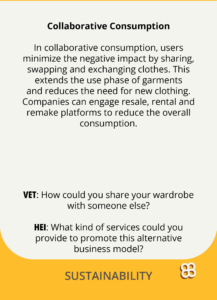Collaborative Consumption
Collaborative Consumption, also known as the sharing economy or peer-to-peer sharing, refers to a consumption model in which individuals or communities share resources, products, or services among themselves rather than owning them individually.
It is a shift away from traditional ownership-based consumption towards a more collaborative and access-based approach. In the fashion domain, collaborative consumption involves sharing and exchanging clothing and accessories, allowing individuals to access a wide range of fashion items without the need for full ownership.
Collaborative consumption can take various forms. One prominent example is clothing rental platforms, where individuals can rent garments for a specific period rather than purchasing them outright. These platforms provide access to a diverse selection of clothing styles and brands, allowing users to experiment with different looks and wear designer pieces at a fraction of the cost. It promotes a more sustainable approach to fashion by reducing the need for single-use garments and encouraging the reuse of clothing items.
Another aspect of collaborative consumption in fashion is peer-to-peer sharing platforms, where individuals can lend or borrow clothing from one another. These platforms facilitate direct interactions between users, creating a community-driven sharing network.
Users can list their own clothing items that they are willing to lend, and others can borrow those items for a specific duration. This fosters a sense of community and promotes the idea of shared ownership, enabling individuals to maximize the usage of their wardrobe and reduce the overall demand for new clothing.
Collaborative consumption in the fashion domain can also extend to clothing swaps or exchanges. These events or online platforms enable individuals to exchange their pre-owned clothing items with others. Participants bring in garments they no longer wear or need and can swap them for items of similar value. Clothing swaps promote sustainability by giving garments a new lease on life and reducing the amount of clothing that ends up in landfills.
Furthermore, collaborative consumption can involve co-creation platforms where users can participate in the design process of fashion items. This allows individuals to contribute their ideas, preferences, and skills, resulting in personalized and unique clothing pieces. Through these platforms, users can collaborate with designers or brands to create custom-made garments or accessories, fostering a sense of involvement and creativity in the fashion experience.
Case studies
Depop
Depop is a peer-to-peer fashion marketplace where users can buy and sell pre-owned clothing and accessories. It creates a community-driven platform where individuals can discover unique, vintage, and fashion-forward items while promoting sustainable fashion practices.
Swap.com
Swap.com is an online clothing swap platform that allows users to trade their gently used clothing items with others. Users can list their items for swapping and browse the available inventory to find items they want. It encourages a culture of sharing and reduces clothing waste.
Share Wardrobe
Share Wardrobe is a fashion-sharing platform that enables users to lend and borrow clothing from their community. It aims to reduce overconsumption and promote sustainable fashion choices by encouraging users to share their wardrobe items with others.
Vestiaire Collective
Vestiaire Collective is a luxury fashion resale platform that enables individuals to buy and sell pre-owned designer clothing, shoes, and accessories. It provides a trusted marketplace for fashion enthusiasts to access luxury items at more affordable prices, contributing to a more sustainable and circular fashion economy.
Yerdle
Yerdle is an online marketplace that focuses on facilitating the exchange of used clothing and other items between individuals. It promotes a collaborative and sharing approach to consumption, encouraging users to give away items they no longer need and find items they desire.
Hurr Collective
Hurr Collective is a peer-to-peer fashion rental platform that allows users to rent designer clothing and accessories from each other. It enables individuals to monetize their wardrobe by listing their items for rent and provides a sustainable alternative to buying new garments for special occasions.
References
Arrigo, E. (2021). Collaborative consumption in the fashion industry: A Systematic Literature Review and conceptual framework. Journal of Cleaner Production, 325, 129261. https://doi.org/10.1016/j.jclepro.2021.129261
Henninger, C. E., Brydges, T., Iran, S., & Vladimirova, K. (2021). Collaborative fashion consumption – a synthesis and future research agenda. Journal of Cleaner Production, 319, 128648. https://doi.org/10.1016/j.jclepro.2021.128648
Lee, S. E., Jung, H. J., & Lee, K.-H. (2021). Motivating collaborative consumption in fashion: Consumer benefits, perceived risks, service trust, and usage intention of online fashion rental services. Sustainability, 13(4), 1804. https://doi.org/10.3390/su13041804
Gopalakrishnan, S., & Matthews, D. (2018). Collaborative consumption: A business model analysis of second-hand fashion. Journal of Fashion Marketing and Management: An International Journal, 22(3), 354–368. https://doi.org/10.1108/jfmm-05-2017-0049
Michalak, S., Bartkowiak, P., Ankiel, M., Olejniczak, T., & Stachowiak-Krzyżan, M. (2022). Motives for the usage of collaborative fashion consumption online platforms. Marketing of Scientific and Research Organizations, 44(2), 41–66. https://doi.org/10.2478/minib-2022-0008
